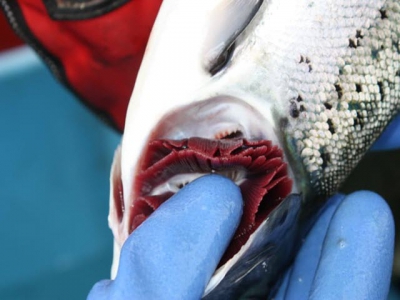Symposium to focus on skin, gills and guts

A brand-new conference that aims to cover issues relating to the skin, gut and gill health of a wide range of cultured fish species is set to take place in Oslo on 11-13 September.
Barrier tissues on the gills, skin and guts of a fish form its first line of defence against pathogens
Called the International Symposium on Mucosal Health in Aquaculture (MHA2019), it will be the first event of its kind to focus on the health of the fish’s barrier tissues such as skin, gills and intestines. These tissues are an effective first line of defence against pathogens, and their status is an important indicator for how fish perform in the farming environment.
“There is an increased attention on the study of mucosal health. Before, only fish immunologists were talking about mucosal immunity, now aquaculture people, in general, are interested in mucosal health. The discussion has been broadened from a fundamental aspect to an applied health focus,” says Nofima’s Carlo C Lazado, who is helping to establish the event.
There is already an increasing evidence that mucosal health can significantly impact the overall health of the fish. Since the mucosal tissues are in close contact with outside environment, they can serve as a sensor on what is happening outside. As well as providing information on the fish, they provide information on the environment, based on the response of the fish.
Content
The sessions in the new symposium have been designed to target both basic and applied research. They will cover mucosal structures and functions, mucosal health and nutrition, mucosal microbiome and mucosal health and the changing environment.
The event targets researchers, fish health biologists, feed producers and the farming industry, as well as people developing treatment equipment and production systems.
The symposium aims at providing a platform to present and discuss the latest mucosal health research in various farmed aquatic species.
“Scientists from Scotland, Spain and Norway are in the committee, while plenary speakers will be from USA, Sweden and Norway – so we want to make this relevant across species and across countries,” says Lazado.
“Mucosal Health in Aquaculture 2019 (MHA2019) will be the first of its kind and my wish is that it will initiate a unique global network dedicated to advance mucosal health research in aquaculture,” Lazado adds.
Bente Torstensen, director of Nofima’s aquaculture division, agrees.
“The scientists in Nofima have worked with this topic internationally over time, and it turns out to be highly relevant across so many disciplines, such as feed, aquatic environment, fish health and welfare. We hope this symposium will be a success that can be repeated,” she says.
MHA2019 has received support from the Research Council of Norway. The deadline for handing in abstracts is 1 June 2019.
Có thể bạn quan tâm
 PRV doesn't pose risk to wild salmon
PRV doesn't pose risk to wild salmon Piscine orthoreovirus (PRV) has no impact on the respiratory systems of Atlantic salmon, and so is unlikely to affect the health of wild Pacific salmon passing
 Salmon growth anomalies explained
Salmon growth anomalies explained A new study involving the University of Stirling has shed fresh light on the link between the life history of fish, their behaviour and their physical character
 Egypt Skretting looks to maximize tilapia farm productivity
Egypt Skretting looks to maximize tilapia farm productivity Skretting said it is continuing to bring its global expertise to bear on the tilapia sector in Egypt.